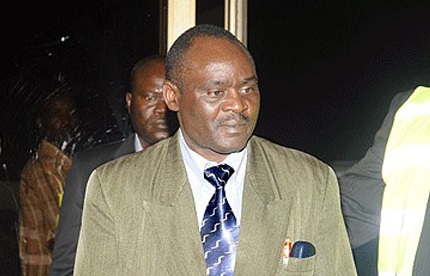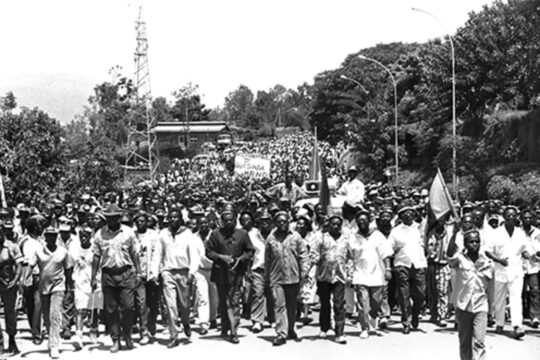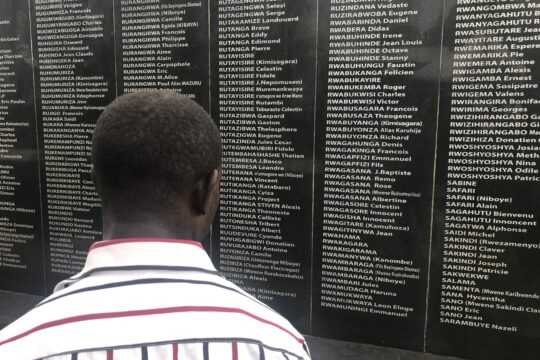Should the transfer to Kigali of the first suspect from the UN’s International Criminal Tribunal for Rwanda (ICTR) be overturned? Procedures have been under way since May before the Mechanism for International Criminal Tribunals (MICT) to answer this question. The decision handed down by this UN residual mechanism for the ICTR and International Criminal Tribunal for the former Yugoslavia (ICTY), is likely to set an important precedent.
Since being sent back to his country three years ago, Pentecostal pastor Jean Uwinkindi has continued to complain of “constant violations” of his rights. But his complaints fell on deaf ears until the MICT decided in May to set up a three-judge panel to consider them.
So what exactly are Uwinkindi’s complaints against the judicial authorities of his country? The former rural pastor, who only speaks his native Kinyarwanda, says he no longer has a lawyer.
After his transfer to Rwanda, he was assigned two lawyers from the Kigali Bar, Gatera Gashabana and Jean-Baptiste Niyibizi. They were assigned because Uwinkindi is deemed indigent, and were paid by the Rwandan government as part of its new judicial assistance programme.
More lawyers dismissed
But it seems they were not happy with their fees. At the beginning of the year, after failed talks with the Ministry of Justice, they resigned from the case. Two new lawyers were then assigned to Uwinkindi, but he rejected them, saying they did not have the necessary skills and experience.
After that, the pastor got a visit in prison by Stella Ndirangu from the Kenyan section of the International Commission of Jurists. The ICJ is mandated by the MICT to monitor Uwinkindi’s trial in Rwanda. Ndirangu summed up Uwinkindi’s complaints in a report. After reading the report, MICT President Theodor Meron of the US ruled on May 13 that the complaints of Uwinkindi, now without a lawyer, constitute a request to have the case taken away from Rwanda. Meron immediately appointed a chamber, presided by Judge Vagn Joensen of Denmark, to consider the request. The very next day, Judge Joensen issued an order with a calendar.
The order said the MICT Registrar should assign Uwinkindi a lawyer, and then he must file a submission within 30 days in support of his request to have the case taken away from Rwanda. On June 22, Registrar John Hocking assigned lawyer Gatera Gashabana.
According to Judge Meron’s order, once Gashabana has filed the submission, the MICT Prosecutor and the Rwandan authorities have 30 days to file submissions in reply. Gashabana can, if he wishes, respond to those documents within 10 days. Amicus curiae (friends of the court) submissions can also be made as part of this procedure, which is unprecedented in the history of relations between Rwanda and international justice.
Munyagishari watching closely
Meanwhile, court procedures continue in Rwanda. The High Court in Kigali ruled that the request before the MICT did not mean procedures had to be suspended. On June 9, the Rwandan court confirmed the new defence team, and granted it time to study the case files. The next hearing is scheduled for September 10.
“I am going to appeal this decision, which is against my rights,” said an angry Uwinkindi. “Please add to the records that I ask the court not to give my case to these people, whom I have said I do not want to represent me.”
According to Rule 14 of the MICT’s Rules of Procedure and Evidence,
“At any time after an order of referral has been issued (…) and before the accused is found guilty or acquitted by a court in the State concerned, the President (of the MICT) may, proprio motu or at the request of the Prosecutor, assign a Trial Chamber that shall decide (…) whether to revoke the order and make a formal request for deferral.”
Where an order of referral is revoked, “the Trial Chamber may make a formal request to the State concerned to transfer the accused to the seat of the relevant branch of the Mechanism, and the State shall accede to such a request without delay”.
Uwinkindi was the first accused person transferred to Rwanda by the ICTR. In July 2013 he was joined by a second one, former militiaman Bernard Munyagishari, who also opposed his transfer to Rwanda. Munyagishari is naturally following closely the procedure launched by Judge Meron. The ICTR also handed over six other case files to Rwanda, relating to accused persons who are still on the run.





